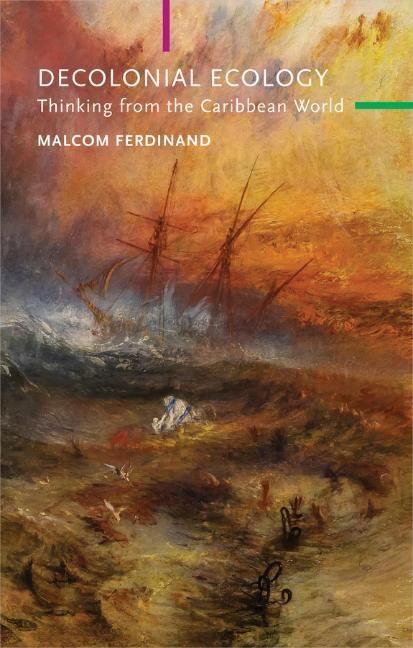Bücher versandkostenfrei*100 Tage RückgaberechtAbholung in der Wunschfiliale
Nur heute: Ihr 15% Rabatt10 auf viele Sortimente mit dem Code 100TAGE
Nur heute: Ihr 15% Rabatt10 auf Spielwaren, Kalender, English Books & mehr mit dem Code 100TAGE
Jetzt einlösen
mehr erfahren
Zustellung: Fr, 11.10. - Di, 15.10.
Versand in 3 Wochen
VersandkostenfreiBestellen & in Filiale abholen:
The world is in the midst of a storm that has shaped the history of modernity along a double fracture: on the one hand, an environmental fracture driven by a technocratic and capitalist civilization that led to the ongoing devastation of the Earth's ecosystems and its human and non-human communities and, on the other, a colonial fracture instilled by Western colonization and imperialism that resulted in racial slavery and the domination of indigenous peoples and women in particular.
In this important new book, Malcom Ferdinand challenges this double fracture, thinking from the Caribbean world. Here, the slave ship reveals the inequalities that continue during the storm: some are shackled inside the hold and even thrown overboard at the first gusts of wind. Drawing on empirical and theoretical work in the Caribbean, Ferdinand conceptualizes a decolonial ecology that holds protecting the environment together with the political struggles against (post)colonial domination, structural racism, and misogynistic practices.
Facing the storm, this book is an invitation to build a world-ship where humans and non-humans can live together on a bridge of justice and shape a common world. It will be of great interest to students and scholars in environmental humanities and Latin American and Caribbean studies, as well as anyone interested in ecology, slavery, and (de)colonization.
In this important new book, Malcom Ferdinand challenges this double fracture, thinking from the Caribbean world. Here, the slave ship reveals the inequalities that continue during the storm: some are shackled inside the hold and even thrown overboard at the first gusts of wind. Drawing on empirical and theoretical work in the Caribbean, Ferdinand conceptualizes a decolonial ecology that holds protecting the environment together with the political struggles against (post)colonial domination, structural racism, and misogynistic practices.
Facing the storm, this book is an invitation to build a world-ship where humans and non-humans can live together on a bridge of justice and shape a common world. It will be of great interest to students and scholars in environmental humanities and Latin American and Caribbean studies, as well as anyone interested in ecology, slavery, and (de)colonization.
Inhaltsverzeichnis
List of Illustrations
Index of Ships
Acknowledgements
Foreword - Angela Davis
Prologue
Part 1: The Modern Tempest: Environmental Violence and Colonial Ruptures
Chapter 1: Colonial Inhabitation: An Earth without a World
Chapter 2: The Matricides of the Plantationocene
Chapter 3: The Hold and the Negrocene
Chapter 4: The Colonial Hurricane
Part 2: Noah's Ark: When Environmentalism Refuses the World
Chapter 5: Noah's Ark: Boarding, or the abandonment of the world
Chapter 6: Reforesting without the World (Haiti)
Chapter 7: Paradise or Hell in the Nature Preserves (Puerto Rico)
Chapter 8: The Masters' Chemistry (Martinique and Guadeloupe)
Chapter 9: A Colonial Ecology: At the Heart of the Double Fracture
Part 3: The Slave Ship: Rising Up from Modernity's Hold in Search of a World
Chapter 10: The Slave Ship: Debarking Off-World
Chapter 11: Maroon Ecology: Fleeing the Plantationocene
Chapter 12: Rousseau, Thoreau, and Civil Marronage
Chapter 13: A Decolonial Ecology: Rising up from the hold
Part 4: A World-Ship: World-Making Beyond the Double Fracture
Chapter 14: A World-Ship: Politics of encounter
Chapter 15: Forming a Body in the World: Reconnecting with a Mother-Earth
Chapter 16: Interspecies Alliances: The Animal Cause and The Negro Cause
Chapter 17: A Worldly-Ecology: On the Bridge of Justice
Epilogue
World-Making
The Intrusion of Ayiti
Recovering the Sun of Africa
Notes
Index of Ships
Acknowledgements
Foreword - Angela Davis
Prologue
Part 1: The Modern Tempest: Environmental Violence and Colonial Ruptures
Chapter 1: Colonial Inhabitation: An Earth without a World
Chapter 2: The Matricides of the Plantationocene
Chapter 3: The Hold and the Negrocene
Chapter 4: The Colonial Hurricane
Part 2: Noah's Ark: When Environmentalism Refuses the World
Chapter 5: Noah's Ark: Boarding, or the abandonment of the world
Chapter 6: Reforesting without the World (Haiti)
Chapter 7: Paradise or Hell in the Nature Preserves (Puerto Rico)
Chapter 8: The Masters' Chemistry (Martinique and Guadeloupe)
Chapter 9: A Colonial Ecology: At the Heart of the Double Fracture
Part 3: The Slave Ship: Rising Up from Modernity's Hold in Search of a World
Chapter 10: The Slave Ship: Debarking Off-World
Chapter 11: Maroon Ecology: Fleeing the Plantationocene
Chapter 12: Rousseau, Thoreau, and Civil Marronage
Chapter 13: A Decolonial Ecology: Rising up from the hold
Part 4: A World-Ship: World-Making Beyond the Double Fracture
Chapter 14: A World-Ship: Politics of encounter
Chapter 15: Forming a Body in the World: Reconnecting with a Mother-Earth
Chapter 16: Interspecies Alliances: The Animal Cause and The Negro Cause
Chapter 17: A Worldly-Ecology: On the Bridge of Justice
Epilogue
World-Making
The Intrusion of Ayiti
Recovering the Sun of Africa
Notes
Produktdetails
Erscheinungsdatum
26. November 2021
Sprache
englisch
Seitenanzahl
300
Reihe
Critical South
Autor/Autorin
Malcom Ferdinand
Übersetzung
Anthony Paul Smith
Weitere Beteiligte
Angela Y. Davis
Verlag/Hersteller
Produktart
kartoniert
Gewicht
456 g
Größe (L/B/H)
213/138/27 mm
ISBN
9781509546237
Pressestimmen
"Malcom Ferdinand brilliantly breaks away from the spider web of canonical ecological narratives and arguments. The wrongdoing of modernity is diagnosed from the decolonial Caribbean experience of coloniality. Decolonial Ecology reveals - through the power of storytelling - that the sacralization of reason, statistics, and mega-data has prevented us from realizing that ecological and colonial problems cannot be solved within the blindness of the Western modernity that created the problems."
Walter D. Mignolo, author of The Politics of Decolonial Investigations
Walter D. Mignolo, author of The Politics of Decolonial Investigations
Bewertungen
0 Bewertungen
Es wurden noch keine Bewertungen abgegeben. Schreiben Sie die erste Bewertung zu "Decolonial Ecology" und helfen Sie damit anderen bei der Kaufentscheidung.










